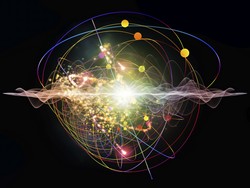When mathematics and physics meet
Such constructive interplay has taken place within the EU-funded project QIFCT (Quantum integrability, conformal field theory and topological quantum computation). Leading experts from Europe and non-EU countries joined their efforts to gain a better understanding of new aspects of matter through experiments performed with cold atoms and condensed matter systems. Essential ingredients of QIFCT research were the notion of quantum integrability, permitting the possibility of arriving at exact results and conformal field theory. This quantum field theory describes the behaviour of physical systems that are invariant under conformal transformations. It has offered numerous results to problems in different branches of mathematics and physics. Results of particular interest concerned the properties of extended quantum systems once pushed out of equilibrium and under what conditions they reach thermal equilibrium (thermalisation). During QIFCT, scientists have clarified fundamental issues regarding the existence of a generalised Gibbs state and the associated charge conservation. The team found exact solutions for cold atom systems and quantum spin chains of low-dimensional systems – both being particular examples of quantum integrable systems. Furthermore, a particular unitary transformation has been generalised to yield steady-state solutions. Other methods successfully addressed quantum impurity problems such as the Kondo effect for multi-coupled spin-chain systems. Integrable quantum chains of interacting non-Abelian anyons – a type of quantum excitation with fractional quantum statistics – have also received the attention of QIFCT scientists. These are considered to play an important part in topological condensed matter systems as they could be used to construct topological quantum computers. QIFCT has achieved significant progress in the theoretical study of quantum matter and its negativity – a measure of its quantum entanglement. The focus was set on the entanglement spectrum of quantum Hall systems, the relationship between the entanglement and quench processes, and quantum entropy. Some of the QIFCT results have already been published, and the rest will be published in the near future. Collaborations have been established that promise to be fruitful in resolving many open issues using ideas and tools from mathematics and theoretical physics.



